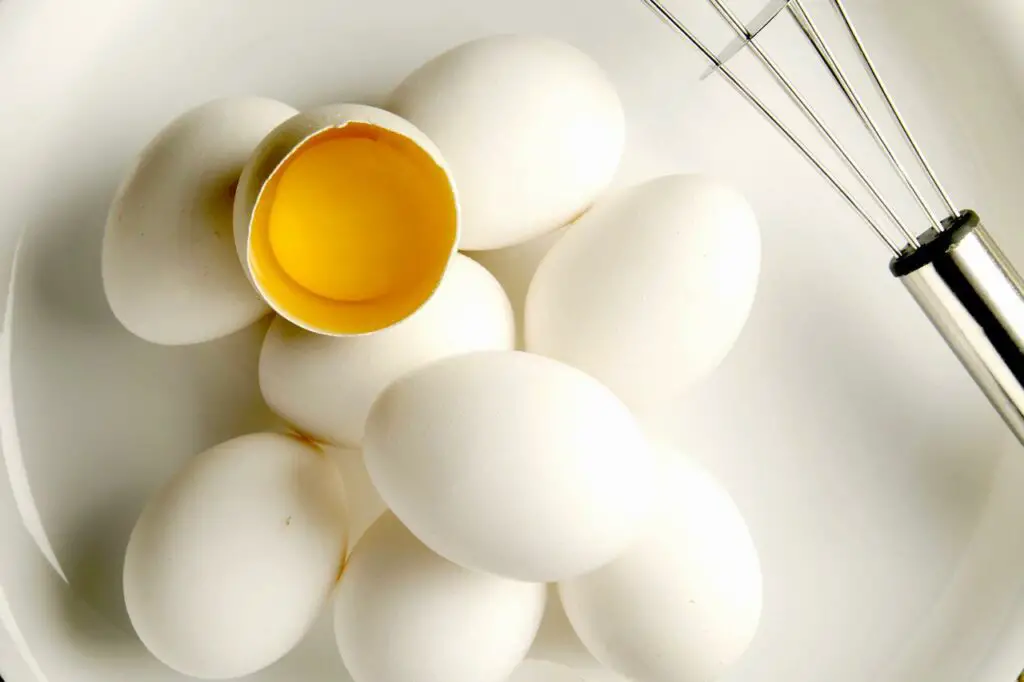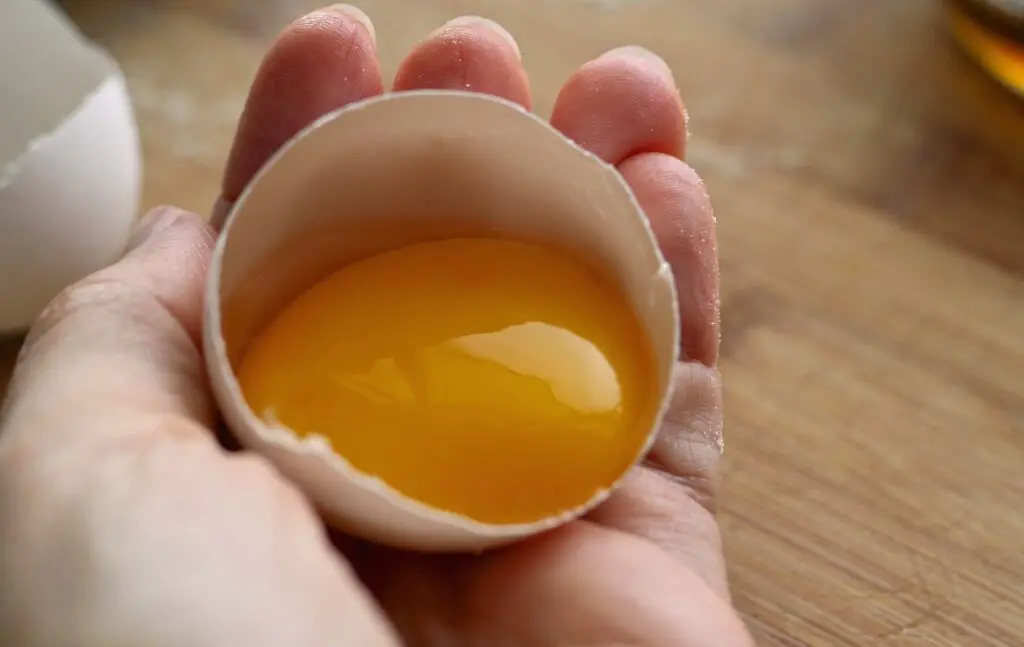Egg whites are a delicious and healthy breakfast choice for most of us as they’re virtually fat-free and low on cholesterol.
While they are considered safer for human consumption, you might be wondering whether they’re also healthy for fidos.
So, can dogs have egg whites?
Yes.
You can offer your dog plain egg whites in moderation.
An occasional egg white, either scrambled or boiled, can be a healthy addition to your fido’s meal.
Egg whites contain essential nutrients like iron, protein, folate, selenium, fatty acids, riboflavin, and vitamin A and B12.
This article will explain everything you need to know about egg whites and dogs.
It will also discuss the potential health risks of feeding your pup egg whites in excess.

Can dogs eat raw egg whites?
No.
Dogs should not be fed raw egg whites as they are considered unsafe for various reasons.
Raw eggs contain bacteria and can cause infections including E.coli and salmonella, whose symptoms are severe and may also be hard to treat.
Some of these symptoms include:
- Depression
- Dehydration
- Vomiting
- Watery diarrhea
- Weight loss
- Skin disease
- Lack of appetite
- Rapid heart rate
- Weakness
- Lethargy
- Stool that may contain blood or mucus
- Anorexia
Raw egg white also contains a protein called avidin, which binds biotin.
If your dog eats raw egg white, it may induce biotin deficiency as the synthesized biotin bundled up by the avidin cannot be utilized by dogs.
Boiling or scrambling the egg whites without any additives while minding the portion is the best way to serve cooked egg white to your pup.

How to feed dogs egg white
You should only offer your dog plain scrambled eggs in moderation.
Scrambled eggs without any additives can be mixed with your pup’s regular meal or offered as a treat.
Avoid feeding your dog egg whites in excess as it could lead to rapid weight gain, causing obesity.
Dogs that consume large amounts of egg whites may also be exposed to bile acid formation and the inhibition of cholesterol synthesis, increasing the risk of high blood pressure.
Before feeding your dog egg whites, ensure the egg is not cracked or dented.
Salmonella and other harmful bacteria can get into the egg once the shell is cracked, increasing your dog’s risk of falling ill.
Potential risks of feeding your dog egg whites
While egg whites are considered safe to consume for your dog in moderation, few things could go wrong if you regularly feed him.
Biotin deficiency
Feeding your dog egg whites in excess can lead to biotin deficiency due to an enzyme inhibitor called avidin.
The enzyme inhibitor may cause indigestion, especially for older dogs and puppies.
Avidin may also interfere with your dog’s ability to absorb biotin or vitamin B7.
Biotin or vitamin B7 aids in synthesizing fatty acids and glucose in the body.
Avidin interrupts this process causing inhibition of cell growth, fatty acid metabolism, and healthy skin.
As a result, your dog may suffer from hair loss and dull skin.
Salmonella
Feeding your dog egg whites increases the chances of salmonella infection for your pup.
Salmonella can cause diarrhea, fever, cramping, and vomiting.
You can reduce the risk of salmonella contamination by:
- Cooking or boiling the egg white before offering it to your pup
- Disposing of eggs with a cracked or broken shell
- Purchasing eggs from credible sources
- Storing the eggs in the fridge and not at room temperature always
- Buying fresh organic eggs
Bile acid formation
Egg whites contain a high amount of animal-derived protein that may cause remarkable disturbances in amino acid metabolism and the inhibition of cholesterol synthesis.
This can increase the risk of high blood pressure in dogs.
In some cases, the gall bladder walls may get damaged, and bile leaks into your dog’s abdomen, causing severe abdominal infection and inflammation, which may be fatal.

Are egg whites safe for dogs?
Yes, dogs can safely consume egg whites in moderation and without extra additives.
Egg whites are a nutrition powerhouse that provides your dog with essential vitamins and nutrients.
These may include:
- Proteins – Proteins provide your dog with stronger muscles, greater bone and body mass, improve nerve function, aid in the creation of cells, and heal your dog’s wounds
- Fatty acids – They provide energy, modulate inflammation, aid in the skin and coat health, promote a strong immune system, support normal reproduction, and play a role in cell growth
- Folate – Folate is important in normal blood formation, immune function, cell division, and tissue growth
- Selenium – Selenium helps in antioxidant function, thyroid metabolism, synthesis of DNA, and reproduction. It also helps with improved joint health and skin and coat condition
- Riboflavin – Riboflavin supports digestion by breaking down protein, carbohydrates, and fat and turning them into energy. It also supports growth and healing, and the repairing and growth of DNA
- Vitamin A – Vitamin A supports healthy eyes (including night vision) and skin, the formation of organs and structures in growing animals (morphogenesis), and immune function
- B12 vitamin – It is crucial for a healthy nervous system and brain function and the formation and growth of blood cells. It also maintains great intestinal health
- Iron – Iron is vital for the synthesis of blood. This mineral is directly involved in the formation of red blood cells and hemoglobin
Can a pregnant dog eat egg whites?
Yes.
You can feed your pregnant dog egg whites in moderation without additives like salt and spices.
Egg whites contain essential minerals such as folate that ensues rapid cell growth in pregnancy.
It’s also required to form healthy red blood cells, especially while the fetus is forming.
However, egg whites should not form the majority of her diet as it can result in biotin deficiency due to the enzyme inhibitor called avidin.
In summary
Like all foods, you should limit the number of egg whites your dog consumes in one sitting.
Talk to your vet before adding egg whites to your fido’s diet, as you’ll get proper guidance on the portions and frequency to offer.
- What Dog Breeds Have Pink Skin? - March 24, 2023
- What Are the Most Inspiring Dog Breeding Quotes? - March 20, 2023
- Can Pheromone Spray Help Improve Dog Breeding Results? - March 19, 2023








